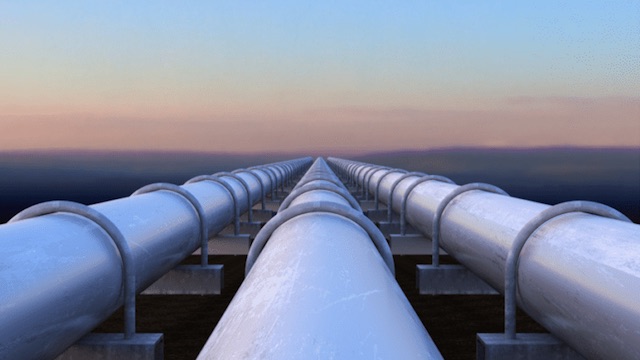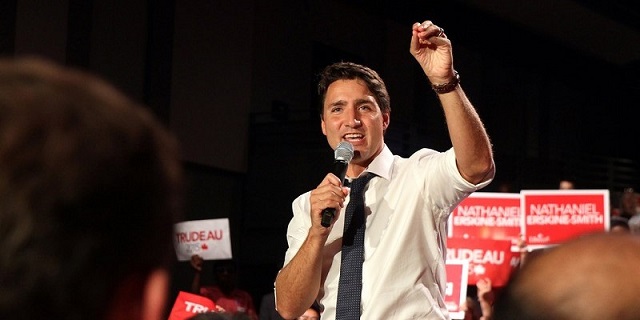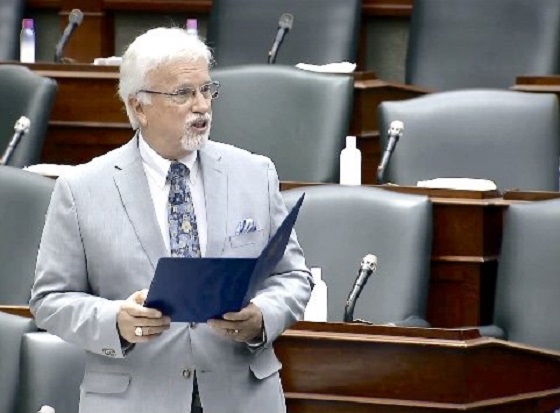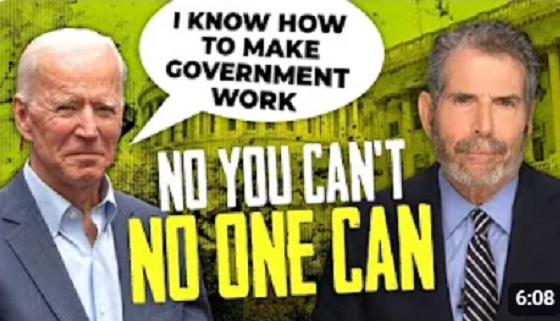Economy
Wrapping Up Canadian Energy 2023 – Prosperity, Power Struggles, Pipelines, EV Promises and “Pie in the Sky” Politics

From EnergyNow Media
By Deidra Garyk
2023 was an optimistic year in the Canadian oil patch. The +15 walkway system in downtown Calgary has been buzzing with the energy of people hurrying to business meetings and networking events.
Some of those scurrying about were headed to talk multi-billion-dollar merger and acquisition (M&A) deals that the patch continued to experience throughout the year. Traditional oil companies also bought alternative energy and carbon tech companies. Carbon capture, utilization and storage (CCUS) was the investment decision of the year.
Oil and gas prices remained relatively high. Not great, but not in the toilet like the dark years of 2015 to 2021. That meant government coffers filled, easing some of the debt burden accumulated during COVID. Oil and gas companies, producers and the many service providers who support the production, were able to continue paying down debt and providing returns to patient shareholders.
Canadian majors Suncor, Cenovus, and Enbridge went through leadership changes at the top. I wish these men success and courage. They are going to need it to embolden pragmatism at all levels of government.
The Canadian federal government continues to be all-in on climate and green energy, seemingly to the exclusion of traditional, reliable energy sources. Although, since climate change has taken a backseat to affordability and energy security for the voting public – the only people politicians really care about – the Liberals have had to rebrand some programs to get buy-in.
One example is renaming the “Just Transition” the Sustainable Jobs Plan. Other than the name, not much has changed. There is still a push for unionized, non-oil and gas jobs.
The feds “invested” (their word, not mine) billions of dollars in EV battery plants, continuing to go all-in on 100 percent EV car sales in twelve years. Senior bureaucrats at Transport Canada even touted the nearness of EV heavy-duty commercial transportation and equipment. (Someone should tell them it will not work well in remote locations with no charging infrastructure.) Energy and Natural Resources Minister Jonathan Wilkinson lauded the day when agricultural equipment goes all electric, fantasizing about the economic boon that will bring. (Someone else should tell him it will not be experienced by farmers who have to spend their hard-earned dollars on equipment replacements.)
Joe Biden visited Ottawa in March. I happened to be there for a conference, so I got to experience the pomp and circumstance first-hand. I have never seen so much security, and I have travelled to places under military control and lived in a country that remains perpetually under the threat of foreign invasion.
Biden’s motorcade is a long, emissions-belching row of vehicles. I did not see any EVs. It includes two “Beasts” (one used as a decoy while the other transports the President), an ambulance, and several tricked-out SUVs. It is quite a spectacle.
As expected, topping the list of topics on the visit’s agenda, President Biden and Prime Minister Trudeau talked about energy and climate, as outlined in their joint statement.
Global sustainability reporting standards were released in June and come into effect January 1, 2024. Publicly traded companies are waiting for Canada to release jurisdiction-specific regulations to understand the magnitude of what will be required. In the Fall Economic Update, released November 22, the feds said rules will be put in place to extend mandatory climate reporting to private companies. That is a big hint at what all companies should expect, at a minimum.
You can listen to my podcast on the subject with energy analyst Dr. Tammy Nemeth here.
On the topic of climate, Bill S-243, An Act to enact the Climate-Aligned Finance Act and to make related amendments to other Acts passed second reading in the Senate in June. You may think this is just some boring Senate bill, but oil and gas boards and employees need to be aware of it.
The bill aims to restrict investment in hydrocarbons, forces companies to set climate commitments, and dictates who has to be part of a company’s board of directors. Worse, section 13(1) Appointment – restriction outlines who cannot be a board member – anyone who works in or owns shares in a fossil fuel company.
It goes as far as to include: “And whereas investment in energy efficiency, clean energy and clean technologies and the incentivization of innovation and behavioural change must replace investments in greenhouse-gas-emission-intensive activities for effective action against climate change.” It targets “fossil fuel activity” in the definition of “emissions-intensive activities”.
Alignment with climate commitments requires that companies:
- take into consideration vulnerable groups, communities and ecosystems, including the biodiversity of those ecosystems,
- make decisions based on equity and the best available science and
- do not promote, foster or exacerbate food insecurity or inequalities in society; and
- do not cause significant harm to social and environmental obligations recognized by Canada.
This bill should trouble any rational person, and it is not getting enough attention. It ramps up climate hysteria and enshrines it into all financial decision making. It is ideological to its core.
I encourage you to read the bill here.
Fortunately, two major, necessary egress projects – Coastal GasLink and Trans Mountain – are well underway before Bill S-243 can stop them. Coastal GasLink reached major milestones of 100 percent pipeline installation and mechanical completion, ahead of schedule. Unfortunately, the federally owned Trans Mountain pipeline has continued to experience delays and a cost increase to $30.9 billion. Although, it was about 80 percent complete in March and expected to be in service in the first quarter of 2024, the project has been delayed due to issues over the route and may not be completed until the end of 2024.
Canada’s summer wildfire season had environmental activists hot and bothered, blaming one thing, and one thing only – climate change!
Calgary hosted the 24th World Petroleum Congress and world energy leaders in September. The torch was passed on to Saudi Arabia to host next. Based on their booth, it will be an extravaganza that will undoubtedly proudly display their oil and gas development. Energy and Natural Resources Minister Jonathan Wilkinson dutifully kept to the Liberal’s script and was challenged to mention the words “oil” and “gas” during his speech at the World Petroleum Congress. This caused the ire of Alberta Premier Danielle Smith, who has had it with the feds’ attitude towards oil and gas.
She has now invoked the Alberta Sovereignty Act in an attempt to prevent the federal government from being able to enact the Clean Electricity Standard by 2035. She has taken a lot of heat for it, but Saskatchewan’s Premier Scott Moe did it first with the colloquially named Saskatchewan First Act. When adversarial Environment and Climate Change Canada Minister Steven Guilbeault threatened to criminalize the use of coal-fired power generation past 2030, Moe puffed out his chest and said, “come get me!”
For all the partisan naysayers attacking the Premiers, I recommend reading Electricity Canada’s response to the Clean Electricity Regulations. It is emotionless and objective, and it sides with the Premiers.
Good thing there is serious discussion about the electricity grid and reliability happening in the Edmonton Legislature because Alberta’s grid operator AESO has issued several warnings in the last year, on both hot and cold days. This has me impatiently waiting for the 2,700 megawatts of new natural gas-powered generation to come on in 2024.
November was all about the carbon tax fight. The feds doubled down on the importance of carbon taxes in the fight against global warming, but not in regions where their sitting MPs risk losing their seats (i.e. their jobs) in the next election. If you think it was not political, you are fooling yourself. They are still fighting over the applicability of a tax on farmers. As someone who eats, I would like it removed to keep the cost of food down.
Premier Moe will not charge Saskatchewan residents carbon tax on natural gas and electricity used to heat homes. This seems reasonable considering that it gets really, really, really cold in Saskatchewan for many days in the winter and reliable energy is a must.
In a hotter region of the world, Dubai, United Arab Emirates hosted COP28 in December. It is the twenty eighth UN climate conference, and yet we appear no closer to solving the thing they say is a crisis – rising emissions. The globe reached the height of emissions in 2023, even though coal use is down and renewable energy capacity and investment is up, up, up, according to the International Energy Agency.
As expected, Canada made various expensive pledges. Minister Guilbeault bounces to the podium for a photo op, drops a climate pledge or two, and the rest of us are left trying to figure out how to meet the commitment. The most contentious for Alberta and Saskatchewan was the oil and gas emissions cap that has been called a de facto production cap.
GEOPOLITICS
With energy security remaining a priority for citizens, nuclear is no longer a bad word. Countries and regions are expanding existing nuclear infrastructure and there is increasing public acceptance for small modular reactors. The false fear tactics used by the anti-nuclear activists have finally been shown for what they are – exaggerated and untrue.
The BRICS alliance expanded with the addition of six new members: Iran, Saudi Arabia, Egypt, Ethiopia, Argentina, and the United Arab Emirates.
Not only are the BRICS nations population and economic power players, they hold the keys to unlocking vast reserves of reliable energy. Total oil production from BRICS nations will be between 40-45 percent of global oil production, more than OPEC’s 35-40 percent. In addition, the members hold vast reserves of the minerals needed for any future energy transformation.
Forty other countries applied to join, demonstrating an interest in the group. Western leaders and NGOs would be wise to pay attention to the growing influence of the BRICS, even if they dislike some of the members.
BRICS is my geopolitical story of the year as it continues to disrupt global energy markets. In 2022, India increased purchases of discounted Russian oil by forty percent. This year, India purchased oil from the United Arab Emirates in rupees, their local currency. These are two examples of the shifts that are happening but are seemingly ignored by the West.
Overall, it appears that pragmatism and realism are influencing political energy decisions, and 2024 is expected to be another positive year for the Canadian oil patch.
All the best for the new year. May you enjoy peace and prosperity.
About Deidra Garyk
Deidra Garyk has been working in the Canadian energy industry for almost 20 years. She is currently the Manager, ESG & Sustainability at an oilfield service company. Prior to that, she worked in roles of varying seniority at exploration and production companies in joint venture contracts where she was responsible for working collaboratively with stakeholders to negotiate access to pipelines, compressors, plants, and batteries.
Outside of her professional commitments, Deidra is an energy advocate and thought leader who researches, writes, and speaks about energy policy and advocacy to promote balanced, honest, fact-based conversations.
Economy
Young Canadians are putting off having a family due to rising cost of living, survey finds

From LifeSiteNews
An April study has found that 42% of Gen Z and 39% of Millennials are putting off starting families due to a lack of work-life balance spurred by an increase in the cost of living.
A survey has found that more Canadians are delaying starting a family due to a lack of work-life balance spurred by the rising cost of living.
According to an April 24 Express Employment Professionals-Harris Poll survey, one-third of employed job seekers stated that they are putting off starting a family due to a lack of work-life balance, including 42% of Gen Z and 39% of Millennials.
“The most common thing I hear from candidates who are putting off starting a family is that the cost of living is too high,” Jessica Culo, an Express franchise owner in Edmonton, Alberta stated.
“We definitely hear more and more that candidates are looking for flexibility, and I think employers understand family/work balance is important to employees,” she added.
Two-thirds of respondents further stated that they believe it’s essential that the company they work for prioritizes giving its employees a good work-life balance as they look to start a family. This included 77% of Gen Z and 72% of Millennials.
The survey comes as Canada’s fertility rate hit a record-low of 1.33 children per woman in 2022. According to the data collected by Statistics Canada, the number marks the lowest fertility rate in the past century of record keeping.
Sadly, while 2022 experienced a record-breaking low fertility rate, the same year, 97,211 Canadian babies were killed by abortion.
Canadians’ reluctance or delay to have children comes as young Canadians seem to be beginning to reap the effects of the policies of Prime Minister Justin Trudeau’s government, which has been criticized for its overspending, onerous climate regulations, lax immigration policies, and “woke” politics.
In fact, many have pointed out that considering the rising housing prices, most Canadians under 30 will not be able to purchase a home.
Similarly, while Trudeau sends Canadians’ tax dollars oversees and further taxes their fuel and heating, Canadians are struggling to pay for basic necessities including food, rent, and heating.
A September report by Statistics Canada revealed that food prices are rising faster than the headline inflation rate – the overall inflation rate in the country – as staple food items are increasing at a rate of 10 to 18 percent year-over-year.
While the cost of living has increased the financial burden of Canadians looking to rear children, the nation’s child benefit program does provide some relief for those who have kids.
Under the Canadian Revenue Agency’s benefit, Canadians families are given a monthly stipend depending on their family income and situation. Each province also has a program to help families support their children.
Young Canadians looking to start a family can use the child and family benefits calculator to estimate the benefits which they would receive.
Regardless of the cost of raising children, the Catholic Church unchangeably teaches that it is a grave sin for married couples to frustrate the natural ends of the procreative act through contraceptives, abortion or other means.
Such wisdom has even bled into the mainstream in recent years, with non-Catholic pundits like America’s Tucker Carlson advocating that young people “Get married when you’re too young, have more kids than you can afford, take a job you’re not qualified for, live boldly.”
Economy
Today’s federal government—massive spending growth and epic betting

From the Fraser Institute
One can legitimately ask whether the federal government has simply grown too big, complex and unwieldy to be managed at all
The Trudeau government’s 2024 budget landed with a thud, evoking little enthusiasm and drawing spirited criticism from business leaders, investors, provincial premiers and (of course) the opposition parties. Several elements of the budget have garnered outsized attention, notably the pledge to run endless deficits, the imposition of higher capital gains taxes, and various new programs and policy initiatives intended to address Canada’s housing crisis.
But the budget includes a few eye-catching data points that have been downplayed in the subsequent political and media commentary.
One is the sheer size of the government. The just-completed fiscal year marked a milestone, as Ottawa’s total spending reached half a trillion dollars ($498 billion, to be exact, excluding “actuarial losses”). According to the budget, the government will spend $95 billion more in 2024-25 than it planned only three years ago, underscoring the torrid pace of spending growth under Prime Minister Trudeau.
One can legitimately ask whether the federal government has simply grown too big, complex and unwieldy to be managed at all, even if we assume the politicians in charge truly care about sound management. How many parliamentarians—or even cabinet ministers—have a sufficient understanding of the sprawling federal apparatus to provide meaningful oversight of the vast sums Ottawa is now spending?
The ArriveCAN scandal and chronic problems with defence procurement are well-known, but how good a job is the government doing with routine expenditure programs and the delivery of services to Canadians? The auditor general and the Parliamentary Budget Officer provide useful insights on these questions, but only in a selective way. Parliament itself tends to focus on things other than financial oversight, such as the daily theatre of Question Period and other topics conducive to quick hits on social media. Parliament isn’t particularly effective at holding the government to account for its overall expenditures, even though that ranks among its most important responsibilities.
A second data point from the budget concerns the fast-rising price tag for what the federal government classifies as “elderly benefits.” Consisting mainly of Old Age Security and the Guaranteed Income Supplement, these programs are set to absorb $81 billion of federal tax dollars this year and $90 billion by 2026-27, compared to $69 billion just two years ago. Ottawa now spends substantially more on income transfers to seniors than it collects in GST revenues. At some point, a future government may find it necessary to reform elderly benefit programs to slow the relentless cost escalation.
Finally, the budget provides additional details on the Trudeau government’s epic bet that massive taxpayer-financed subsidies will kickstart the establishment of a major, commercially successful battery and electric vehicle manufacturing “supply chain” in Canada. The government pledges to allocate “over $160 billion” to pay for its net-zero economic plan, including $93 billion in subsidies and incentives for battery, EV and other “clean” industries through 2034-35. This spending, the government insists, will “crowd in more private investment, securing Canada’s leadership” in the clean economy.
To say this is a high-risk industrial development strategy is an understatement. Canada is grappling with an economy-wide crisis of lagging business investment and stagnant productivity. Faced with this, the government has chosen to direct hitherto unimaginable sums to support industries that make up a relatively small slice of the economy. Even if the plan succeeds, it won’t do much to address the bigger problems of weak private-sector investment and slumping productivity growth.
Author:
-

 Education15 hours ago
Education15 hours agoSupport a young reader through the Tim Hortons Smile Cookie campaign
-

 Alberta1 day ago
Alberta1 day agoAlberta’s vision for passenger rail
-

 RCMP1 day ago
RCMP1 day agoRed Deer RCMP arrest two individuals following ramming of police vehicle
-

 COVID-192 days ago
COVID-192 days agoFormer Canadian lawmaker has no regrets about refusing COVID shot despite losing his job
-

 COVID-192 days ago
COVID-192 days agoPeckford: Hallelujah! Supreme Court of Canada to hear Newfoundland and Labrador charter case
-

 John Stossel2 days ago
John Stossel2 days agoWhy Biden’s Just Wrong: NO ONE “Knows How to Make Government Work.”
-

 Education2 days ago
Education2 days agoRebels earn Jim Donlevy Memorial Trophy as WHL Scholastic Team of the Year
-

 Alberta2 days ago
Alberta2 days agoThree Calgary massage parlours linked to human trafficking investigation







